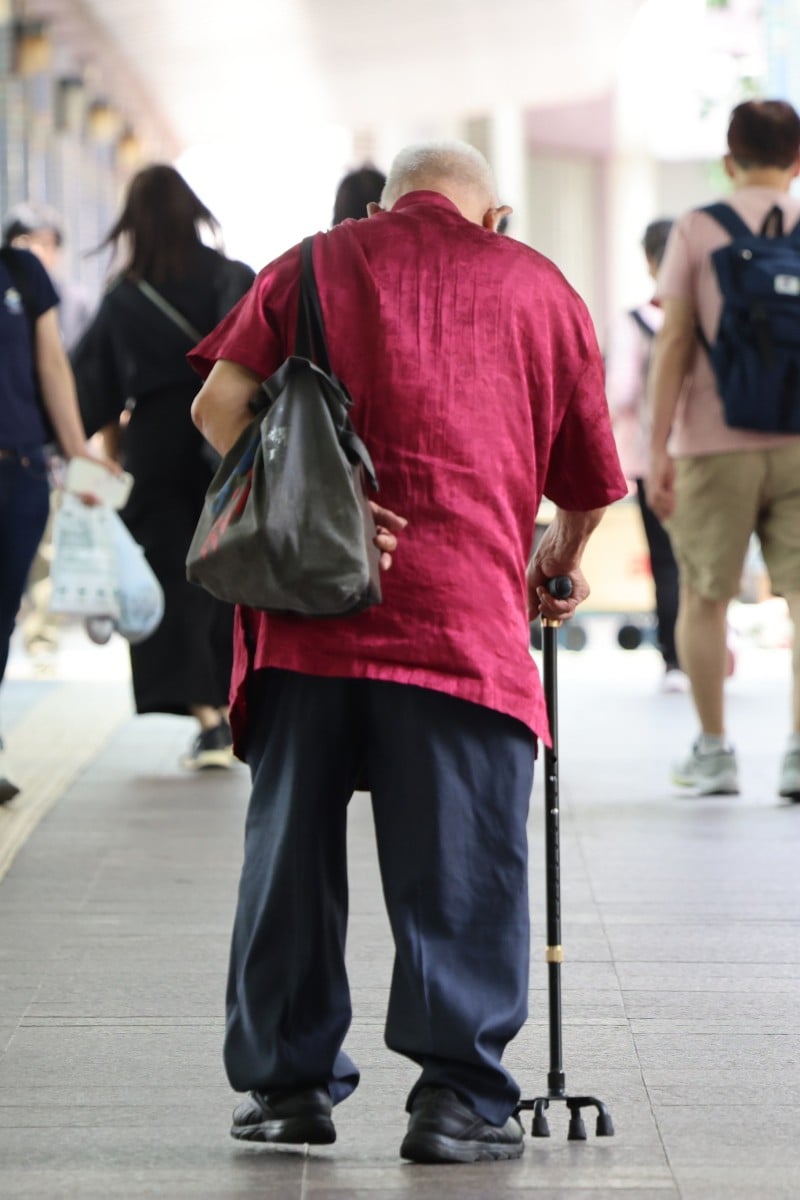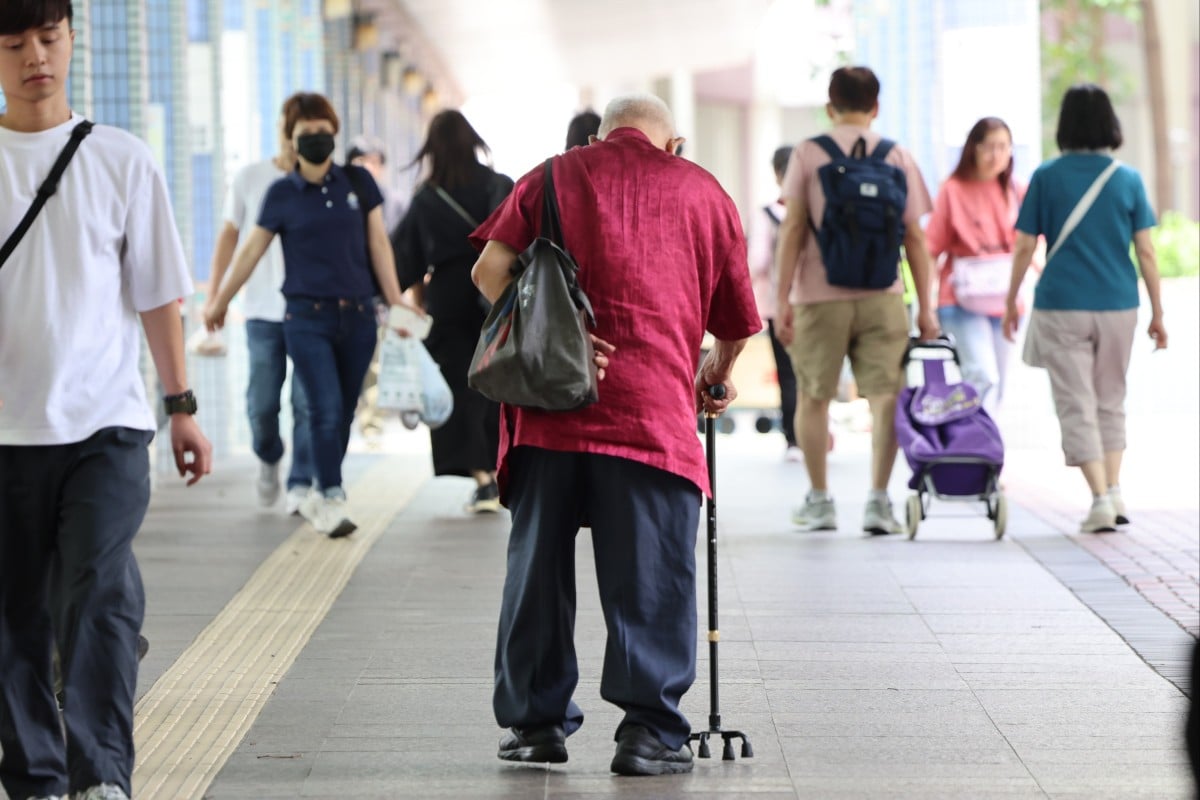
Why are Hong Kong elderly depressed? Social isolation, stigma among reasons
A psychiatrist and a senior volunteer discuss the factors behind these mental health challenges, as well as potential solutions
 Many older Hongkongers struggle with mental health issues. Photo: Jelly Tse
Many older Hongkongers struggle with mental health issues. Photo: Jelly TseHong Kong Christian Service volunteer Wong Lum-kuen was shocked when she stepped into an elderly person’s flat to find it had no windows and no lighting.
“The only light came from the TV,” the 72-year-old told Young Post through a translator, adding that NGO volunteers returned later to install lights.
Wong has been volunteering for more than five years with Hong Kong Christian Service, an NGO that runs programmes encouraging community members to care for the elderly through activities, home visits and more. Wong and her husband, Charles Mok Yiu-chung, who is also a volunteer, have seen many people in difficult situations.
“[Some] never go outside and never seek help,” she said.
Wong has worked with many seniors struggling with mental health issues such as depression. She said she could empathise with them because she battled depression about seven years ago.
‘It can be very lonely’: why socialising is crucial for Hong Kong elderly
How depression manifests
Linda Lam is a professor of psychiatry at the Chinese University of Hong Kong (CUHK) and a member of the government’s Advisory Committee on Mental Health.
Lam explained some signs of depression.
“[For] at least two weeks, you feel pervasively unhappy, and the degree of unhappiness affects your function,” the professor said.
She added that depressed people might feel pessimistic and show a loss of interest in doing things. Depression also manifests in symptoms such as poor sleep quality, rapid weight loss, constipation, disturbances to the menstrual cycle and more. It often affects relationships as well.
In Hong Kong, elderly depression is a pressing issue.
According to survey results released in 2023 by the Society for Community Organisation, more than 48 per cent of elderly respondents reported symptoms of moderate to severe depression.
In a separate study conducted earlier this year, CUHK and the Salvation Army reported that the proportion of seniors with moderate or severe loneliness had nearly doubled since 2018.
Lam pointed to several situations that could increase the risk of depression in the elderly.
She said that retirement could be a huge milestone with a lot of uncertainty and change, including in someone’s finances or social life. Those who retire may be unsure of how to fill up their time.
“The sense of achievements and the self-esteem might have been affected,” she said.
According to Lam, another huge factor affecting elderly depression in Hong Kong is when their family moves away. This has become more common amid the city’s emigration wave.
“We [have been] bombarded with a group of people who the kids left, leaving them to stay in Hong Kong ... [it’s] a lot of sudden change in their psychosocial support system,” she said.
“Family moving away is particularly important in the recent few years.”
Despite challenges of aged care in Hong Kong, a young carer finds fulfilment
Wong agreed that a lack of family time could trigger loneliness in the elderly.
“Maybe the younger generation is busy with work, so they do not have enough time to take care of [their elders], who will feel lonely and helpless,” she said.
In Wong’s case, her depression was a product of taking care of her mother all the time. The weight of this responsibility caused her mental health to wither.
“When taking transport to visit my mother, I couldn’t breathe. When we went through a tunnel or in the MTR, I couldn’t breathe,” she recalled. “During this time, I couldn’t control myself and my emotions.”
Wong said she “refused” to face her mental health problems until her mother passed. After that, she felt comfortable enough to seek proper treatment and take medicine for her depression, which she continues to use today.
How to help elderly family members
While depression can seem scary, especially if it affects someone in your family, Lam had suggestions for how young people could be proactive in supporting their elderly loved ones.
Firstly, they should pay attention to the attitudes and emotions of their grandparents and older family members.
“Notice the feeling that Granny has changed,” Lam said. “Grannies in Hong Kong are very concerned about their grandchildren ... If [your] grandparents stop asking [questions], then that is unusual.”
Lam noted another concerning sign: “The old person only replies with one word or one sentence.”
The professor also suggested that grandchildren regularly call or visit their elders to keep their spirits high. If there are any alarming signals, they should discuss them with their parents.
Lam also encourages open discussion about mental health and depression among families to quash any stigma associated with the topic.
“Many people still have hesitancy in accepting that family members may be depressed,” she said.
To normalise the topic, she advised having open and honest discussions about everyone’s mental health around the dinner table.
In Peng Chau, volunteers are building intergenerational bonds with elderly
Lam’s final message to elderly Hongkongers was to go into this new chapter of life with optimism.
“Getting old does not mean that you should compromise the quality of life,” she said. “Everybody should have a right to enjoy whatever their life gives them and every moment of joy.”
Wong recommended that other elderly people continue to “learn and share” even after retirement by socialising and joining activities.
When she was depressed, regaining a sense of community helped her. At first, she did not tell her friends about her depression because she was afraid that they would not accept her. But she eventually found solace in the Hong Kong Christian Service centre.
“In the centre, some of the elderly also suffer from depression. We have similar experiences,” she said.
“At least we can have each other. Talking about this we can release stress.”
-
Stop and think: According to Lam, what are TWO factors that could increase the risk of elderly depression?
-
Why this story matters: In a survey conducted last year, nearly half of elderly respondents had moderate to severe depression or anxiety. It is important to understand what this group is facing and to find ways to support them.
bombarded 轟炸
to be overwhelmed with many things
compromise 妥協
to do something against what you believe or that does not reach standards that you have set
proactive 積極主動
describes someone who controls a situation by making things happen, rather than waiting for things to happen and then reacting to them
quash 廢除
to suppress or put an end to something
solace 安慰
a feeling of emotional comfort when you are sad or disappointed
wither 衰弱
to become weaker
